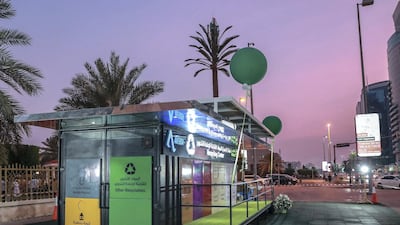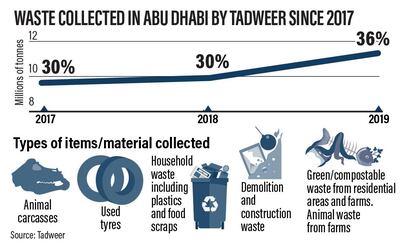UAE society must co-operate in recycling and reducing the amount of rubbish it produces if the country’s environment is to be preserved, a government official said.
Despite efforts to encourage recycling, statistics revealed to The National by Tadweer, Abu Dhabi's Waste Management Centre, showed a significant rise in the amount of waste in the city over the past three years. Little more than a third of that waste is recycled each year.
Majed Al Marzouqi, head of recycling facilities at Tadweer, said society played a "critical role" in waste management, particularly when it came to dealing with foodstuffs, cans and packaging materials.
“Reducing purchasing habits and correctly disposing of plastic materials and other types of waste will all help towards meeting our strategy."
Last year, residents, companies and government departments in Abu Dhabi produced more than 11 million tonnes of rubbish, from food scraps to plastic packaging and construction debris.
On average, individuals and companies in the emirate threw away about 940,000 tonnes of waste each month – almost the weight of two empty Burj Khalifas.
Of the 11.3 million tonnes collected by Tadweer last year, just 36 per cent was sustainably treated at its 26 treatment and recycling centres across the emirate.
In 2017 and 2018, Tadweer collected 9.6 million and 9.9 million tonnes of waste – indicating an increase in waste production overall. About 30 per cent of that rubbish was recycled each year.
Rapid population increase and a rise in consumption has led to growing mountains of rubbish in the Middle East and across the globe.
Abu Dhabi has set ambitious targets to minimise waste generation in the capital – aiming by 2021 to recycle 75 per cent of all items collected. It also plans to reduce the amount of waste that goes to landfill to 15 per cent by 2030.
At present, about 70 to 80 per cent goes straight to dumps in the UAE. Mr Al Marzouqi said collaboration from governments and communities to reduce or eliminate the generation of "harmful and persistent" waste would support a more sustainable society.
"This turnaround will be achieved via two main approaches; increasing awareness education and increasing facility capacity," he said.
"We are constantly looking for ways to reach these goals. Yes, there are challenges but there is no choice; we have to reduce waste now or face the consequences."
Last year, non-hazardous materials, like household rubbish and green waste, accounted for the bulk of waste collected in Abu Dhabi.
Of the 11.1 million tonnes picked up, just 35 per cent was recycled, composted, incinerated or exported for use elsewhere. The rest was sent to landfill.
Hazardous materials, like animal carcasses and medical syringes, accounted for a small fraction of overall waste collected (200,000 tonnes). However, about 98 per cent of this was disposed of sustainably at specialist centres across the emirate.
“Tadweer is planning [and working] on several different projects to help achieve the national agenda,” Mr Al Marzouqi said.
"Some of the projects that will help make Abu Dhabi more sustainable include the upcoming material recovery facilities to [produce] refuse-derived fuel."
RDF is usually produced from everyday items, like paper and cardboard, which have been thrown out for waste collection.
After significant mechanical processing and drying, the leftover particles have a high calorific value and can be used for energy generation in industrial applications, such as cement kilns.
It is processes like this that could make good use of waste that otherwise might have ended up in landfill, Mr Al Marzouqi said.
Other projects Tadweer is working on include the introduction of waste to energy power plants.
In recent years, some of the more visible signs of the strategy included the more than 15 recycling stations that have popped up across the emirate.
The stations allowed residents to move beyond the simple segregation of paper, cans and bottles to include wood, cardboard, mobile phones, used batteries, plastic, wool, metal and cotton.
Located in different places across the city including Khalidiya Public Park, Mr Al Marzouqi said public plays a vital role in curbing waste and consumption habits.
"We recommend the public reduce the use of packaging that is not required and encourage recycling and reuse efforts."



